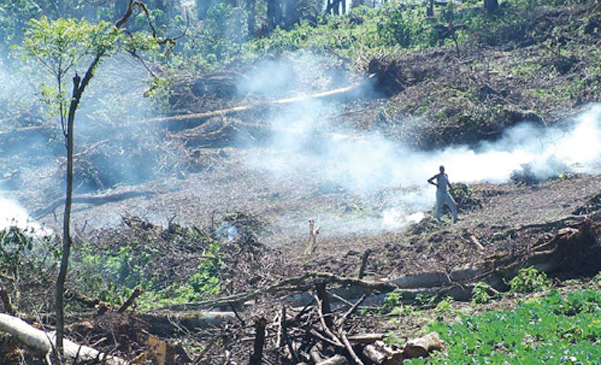By Zachary Ochieng
Narok, Kenya—The sprawling Mau Forest complex—the starting point for a dozen rivers in Kenya and one of the last surviving blocks of uninterrupted forest land in East Africa, is shrinking as logging companies and growing numbers of settlers hack away its trees.
The destruction of the forest, scientists say, is reducing humidity and rainfall and increasing erosion, all of which are having a cascading impact on East African rivers and lakes, the region’s renowned game parks and farming and threatening the supply of drinking water for millions of people.
The scientists say the destruction, in the Mau Forest, about 80 miles southwest of Nairobi, the capital of Kenya, is also contributing to global warming as trees that absorb carbon dioxide are lost.
At the current rate of destruction, United Nations officials estimate, losses to Kenya in tourism, energy and tea farming farming could rise to $300 million annually. Unless the destruction is slowed or halted, “ the whole ecosystem will be lost in 15 years.” Achim Steiner, the executive director of the United Nations Environment Program, told reporters at a press conference in Nairobi.
United Nations and Kenyan government officials say the destruction of the forest has sharply reduced the flow of water into rivers that nourish Lake Victoria—the world’s second largest fresh water lake – and several other lakes including , Lake Naivasha and Lake Nakuru, the home of one of the world’s largest colonies of flamingos. Because of falling water levels, Kenya has been unable to put into operation a new hydro-electric plant.
Around the world, enormous tracts of forest land are disappearing, the United Nations says. “Countries that are facing the most serious challenges in achieving sustainable forest management are those with the highest rates of poverty and civil conflict,” said David Harcharik, the Food and Agricultural Organization’s assistant director-general in an interview in the Guardian, the British newspaper..
Somewhat like the Amazon rain forest that is shared by nine countries, the Mau Forest provides a lifeline beyond Kenya. Most of the rivers from the Mau complex drain into Lake Victoria which is shared by Kenya, Uganda, Rwanda and Tanzania. Already, the fishing communities in these countries have started feeling the impact. Lake Victoria is also a principal source for the Nile River and farmers in Egypt and Sudan are being affected.
In Kenya, a third of the forest land has been lost in the last nine years. In the Mau Forest alone, about a quarter of the original 420,000 hectares or 520,000 acres, has been destroyed .
At Egerton University, one of the Kenya’s five public universities, six of the 17 wells have dried up. The university says it needs 2,600 litres or 1,300 gallons of water daily. It says it is now receiving 1,900 litres a day and that it is trying to close the gap with rain water.
Japan has paid for a hydro-electric power plant on the Sondu-Miriu River nearly 97 kilometers or 60 miles southwest of the Mau Forest. The power plant, which was expected to increase Kenya’s power supply by 5 per cent, was completed in 2007. But it has not begun operating because of low water levels.
One of the greatest intrusions of people into the Mau Forest began eight years ago, in 2001, when then President Daniel arap Moi permitted 10,000 families to stakeout homesites in what his critics say was an effort to bolster political support.
Mwai Kibaki, who is president of Kenya now, and the prime minister, Raila Odinga, maintain that occupation of the Mau Forest is illegal and that it must be protected. But their opponents argue that residents of the forest have nowhere else to go. Some of the people, they say, have documents showing that they own the land – even though all the land in the Mau Forest formally remains the property of the government of Kenya.
People living in the forest cut down trees to make charcoal which they sell and use for heating and cooking. They are adamant about staying. Joseph Sitonik said he will not vacate the forest even at gunpoint. “I have no other place to call home,” he said. “I derive my livelihood from selling charcoal. Where does the government want me to go?” he asked, waving a document that he said proved he was given ownership of the land by government officials during the presidency of Mr. Moi.
Mr. Odinga, the prime minister, recently paid a visit to the Mau Forest. Talking to residents, he said he was troubled by the hardship that would be imposed by resettlement. But he said the destruction of the forest and the loss of its water posed an even greater danger to Kenya and its people. “We must conserve the environment,’’ he said. “or we will be cursed by the next generation for handing them a desert.” #

